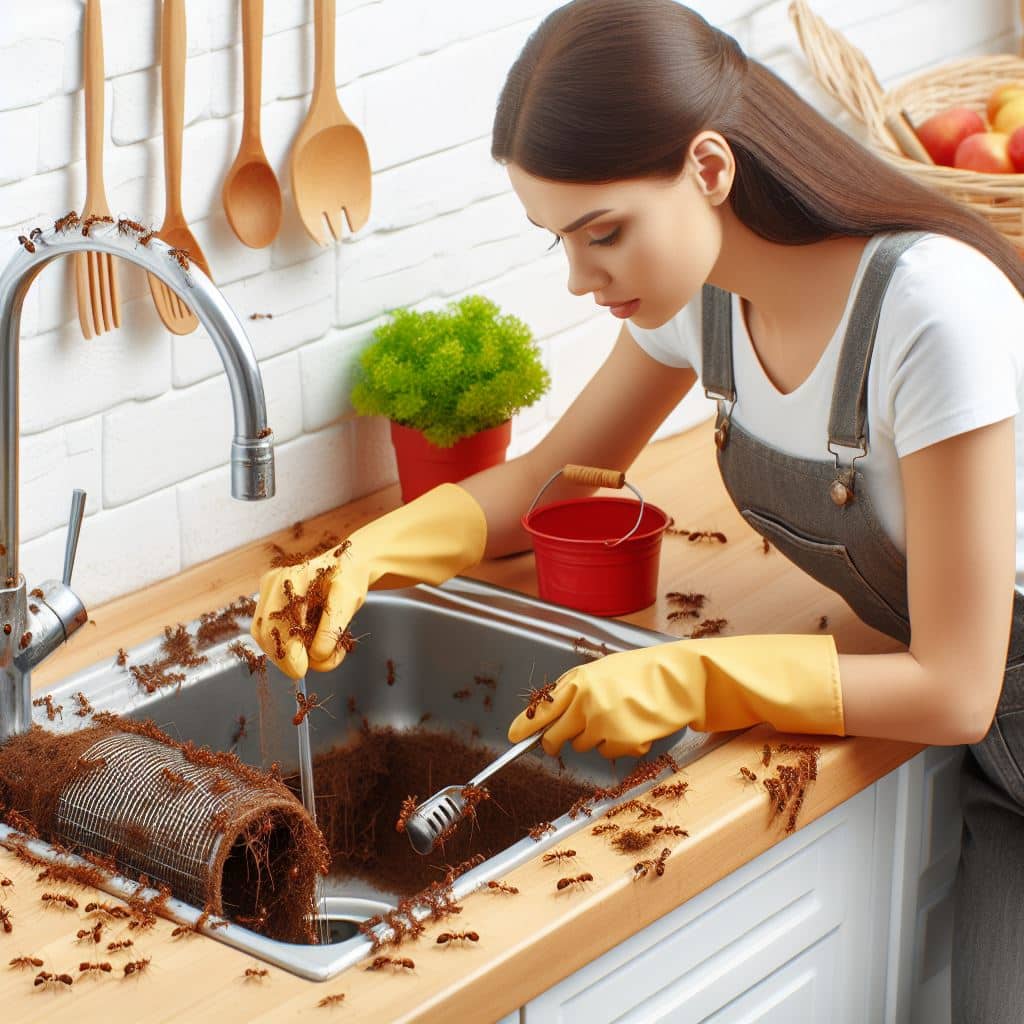To eliminate ants in your kitchen sink drain, pour boiling water followed by a vinegar and baking soda mixture. This simple home remedy is effective for disrupting the ants’ scent trails and nesting environment.
Battling ants in your kitchen sink drain can be a frustrating experience. These persistent insects often invade homes searching for water and food, making your sink a prime target. A clean and well-maintained kitchen is your first line of defense against ant infestations.
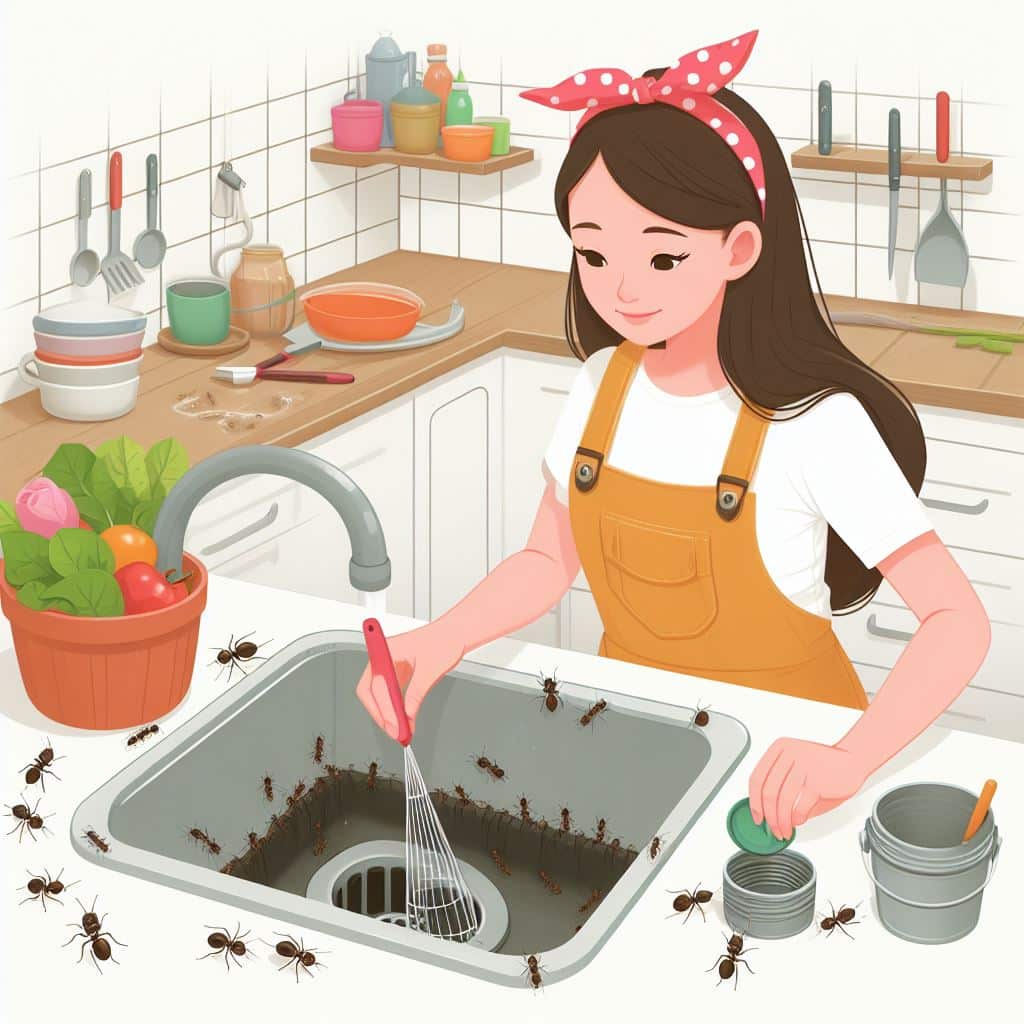
To effectively address the issue of ants in your kitchen sink drain, it’s essential to adopt a proactive approach. Regularly removing food debris and ensuring surfaces stay dry is a good starting point to discourage ants from settling in.
If the problem persists, you may need to take more direct action. One effective and natural solution involves using household items like vinegar, baking soda, and boiling water. These not only disrupt the ants’ habitat but also provide a safe alternative to harsh chemicals.
Maintaining a clean and fresh sink environment is essential in deterring ants. So, “How to Get Rid of Ants in Kitchen Sink Drain?” becomes a central question, prompting you to explore these simple yet effective methods.
Remember, consistency in implementing these measures is key to keeping these unwanted guests at bay in your kitchen.
Ant Infestations In Kitchen Sinks
Are ants turning your kitchen sink into their new hangout spot? An ant invasion in the kitchen can catch anyone off guard,
Kitchen sinks offer a perfect storm for ant gatherings. Understanding why these tiny critters come together in your drain is key to sending them packing.
Identifying The Type Of Ants Invading Your Sink
Recognizing the type of ants in your sink is the first step in the battle. Different ants call for different strategies. Common house invaders include:
- Odorous house ants – They smell like rotten coconut if crushed.
- Carpenter ants – Large and hunt for moist wood.
- Pavement ants – Found near sinks and known to eat anything.
Why Ants Are Attracted To Kitchen Sinks
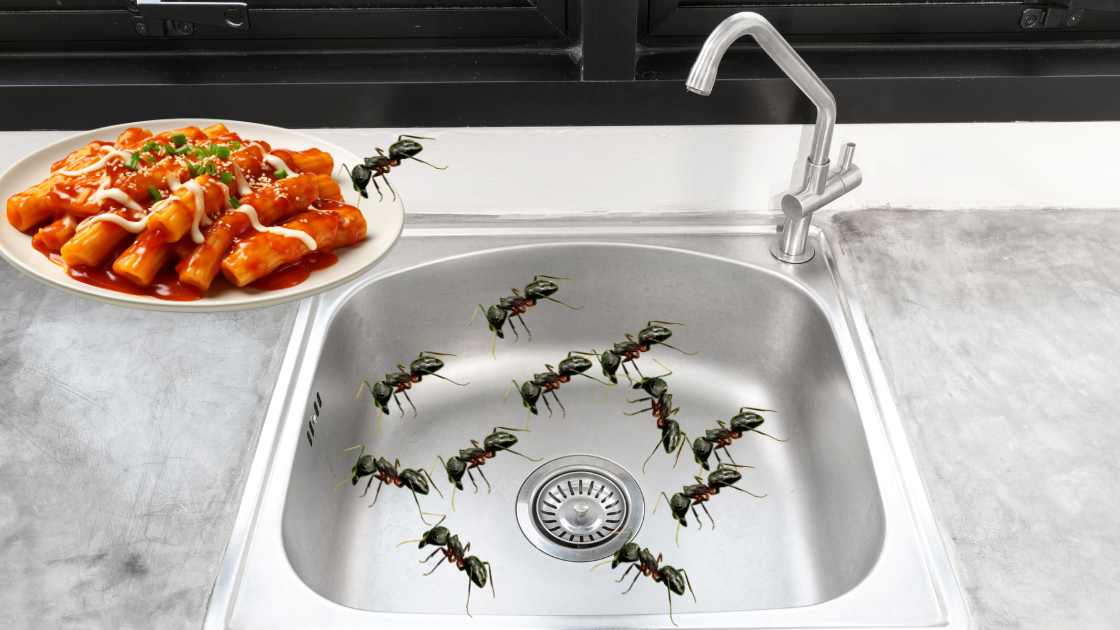
Your sink is an ant haven for reasons including:
- Water – Ants need it to survive.
- Food particles – Tiny scraps are big feasts for ants.
- Sweet and sticky residues – Irresistible to ants.
The Potential Health Risks Of Ant Infestations
Ants in your kitchen aren’t just a nuisance; they can be a health hazard. They march through unclean places before they reach your sink, which may lead to:
| Safety Concern | Issue |
|---|---|
| Contaminated food | Ants can carry bacteria to your food. |
| Allergic reactions | Some people are allergic to ants. |
| Disease spread | Ants can spread diseases like salmonella. |
Prevention Strategies For Ants In The Kitchen
Ants in the kitchen sink drain can be a persistent problem. But prevention is the best defense against these tiny invaders.
By taking proactive steps, we can create an ant-free zone in our kitchens. Let’s explore how to keep them at bay with some well-planned strategies.
Maintaining A Clean Kitchen Environment
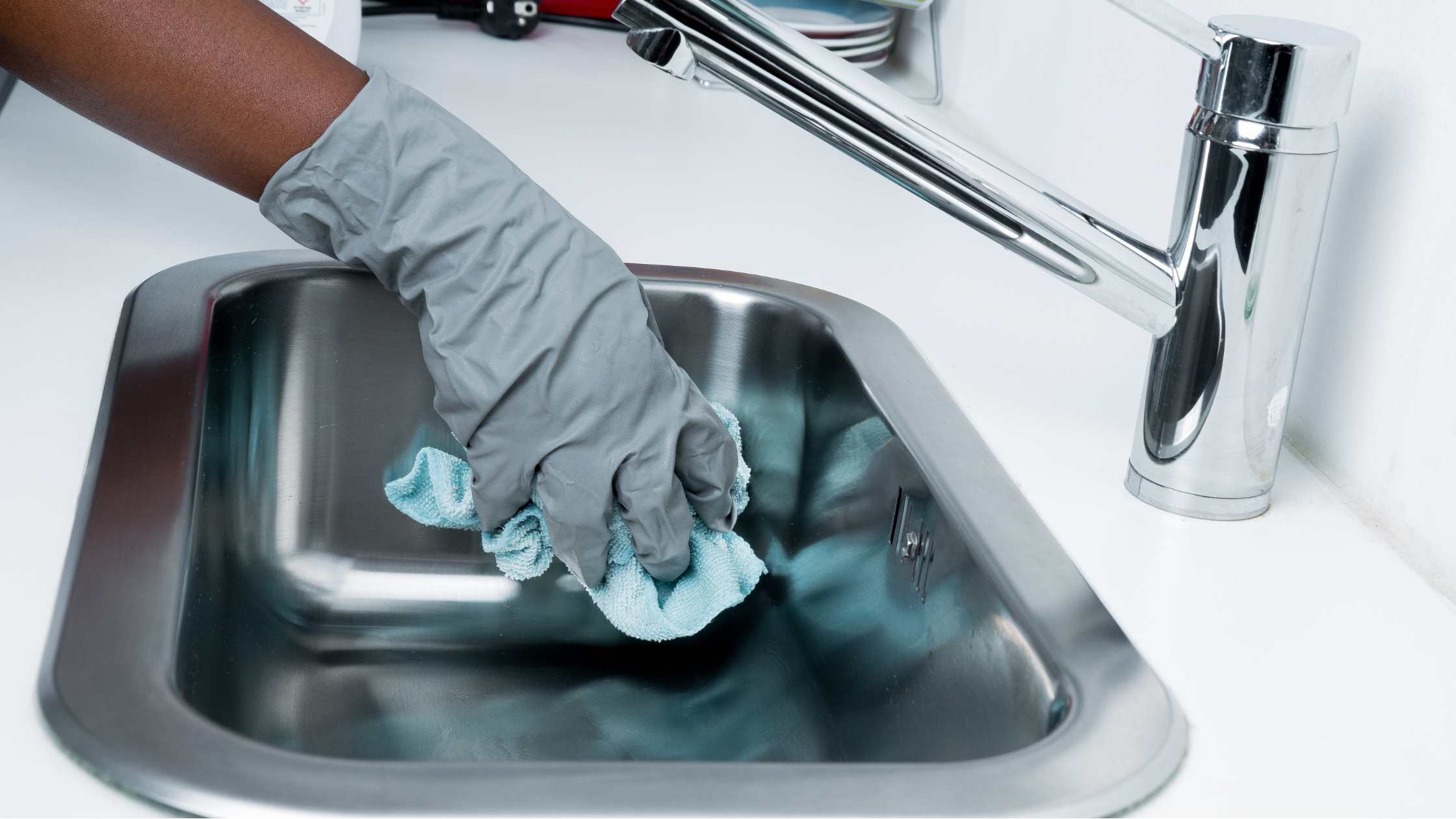
A clean kitchen deters ants. They search for food and water. No trace of food means no ants. Here’s how to maintain cleanliness:
- Clean dishes immediately after use.
- Wipe down counters and surfaces regularly.
- Mop floors to remove spills and crumbs.
- Dispose of garbage daily in sealed bags.
Proper Food Storage To Deter Ants
Proper food storage is key. Use these tips:
- Store food in airtight containers.
- Keep ripe fruit in the fridge.
- Seal pet food bags tightly.
Sealing Entry Points To Keep Ants Out
Ants find the smallest cracks. Seal them out with these steps:
- Inspect the kitchen for cracks and holes.
- Use caulk to seal gaps around windows, doors, and pipes.
- Repair window and door screens.
Natural Remedies To Combat Ants In Sink Drains
Finding ants in your kitchen sink drain may be annoying. Don’t worry! Certain natural remedies exist to clear these pests out. Read on to find out how vinegar, baking soda, and essential oils can keep ants at bay without harsh chemicals.
Using Vinegar Solutions For Ant Control
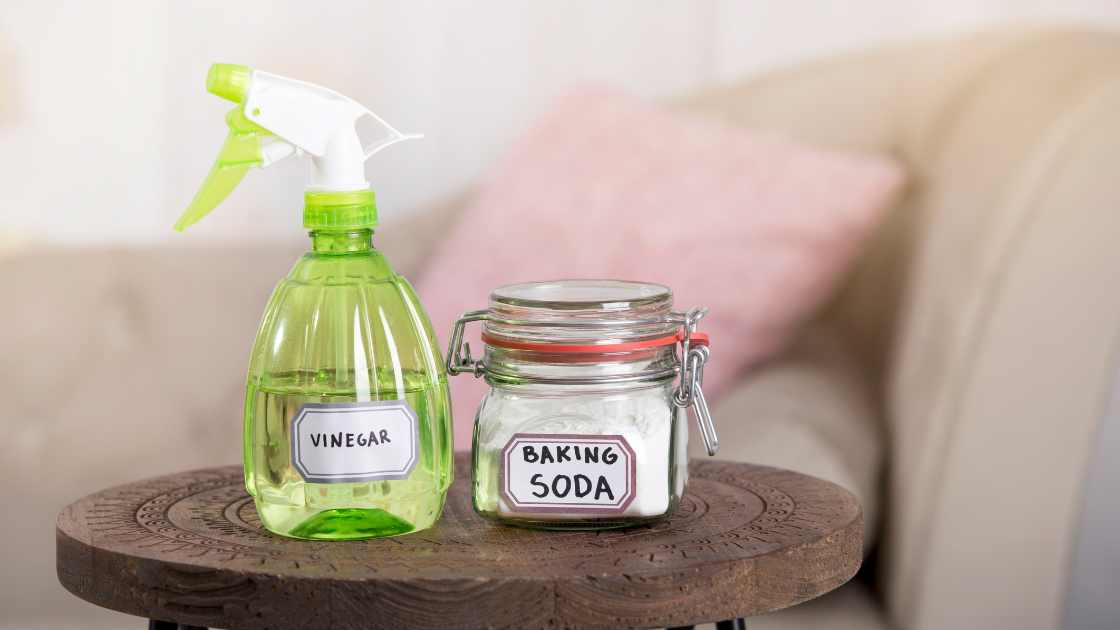
Vinegar is a powerful, natural cleaning agent. It’s great for disrupting the scent trails ants follow. Try this simple method:
- Mix equal parts water and white vinegar.
- Pour the solution down the drain.
- Repeat daily until the ants disappear.
Baking Soda for Ant Elimination
How Baking Soda Can Help Eliminate Ants
Baking soda, combined with sugar, can be a potent ant bait. It’s safe and easy to use.
Here’s how:
- Mix 1 part baking soda with 1 part sugar.
- Sprinkle the mix near the sink drain.
- Ants eat the bait and share it, which helps in removal.
Essential Oils for Ant Prevention
The Role Of Essential Oils In Ant Prevention
Essential oils deter ants with their strong scents. They disrupt ant trails and prevent them from returning.
Effective oils include:
| Essential Oil | Use |
|---|---|
| Peppermint | Add a few drops to a water spray. Use around the sink area. |
| Tea Tree | Apply directly or dilute with water. Spray near the sink. |
| Lemon Eucalyptus | Soak cotton balls and place them near the sink drain. |
Chemical Solutions For Ant Removal
Battle against ants in your kitchen sink drain can be frustrating. These tiny invaders can quickly take over, but effective chemical solutions are available.

They are specifically designed to target ants where they are most active. This includes the hidden pathways inside your sink drain.
By following a careful approach and understanding different ant removal products, you can regain control of your kitchen.
Selecting The Right Ant Bait For Drains
Choosing the correct ant bait is vital for successful elimination. Drains, being moist and dark, might require different baits than other areas. Consider the following points:
- Attractant type: Opt for baits that appeal to the ants’ preferences, typically sugary or protein-based substances.
- Form factor: Solid baits can be difficult to position inside drains, so gel or liquid options might be more effective.
- Placement: Ensure the bait is placed near ant trails or areas where ants are frequently seen.
The Efficacy Of Liquid And Gel Ant Killers
Liquid and gel ant killers are potent tools against ants in drains. Their formulation allows them to travel deep into the nest.
They target the colony’s source. This ensures a thorough ant infestation elimination. When used correctly, these products yield swift results.
Safety Considerations When Using Chemicals
Always prioritize safety when handling ant removal chemicals. Here are key tips for safe usage:
- Read instructions: Never skip the product’s manual. It holds crucial safety information.
- Wear protection: Use gloves and avoid direct skin or eye contact with chemicals.
- Ventilation: Keep the area well-ventilated to prevent inhalation of fumes.
- Storage: Store chemicals in a locked cabinet out of children’s and pets’ reach.
Diy Ant Traps And Bait Stations
Fighting an ant invasion in your kitchen sink drain can seem overwhelming. Yet, with some everyday household items, you can create effective DIY traps and bait stations.
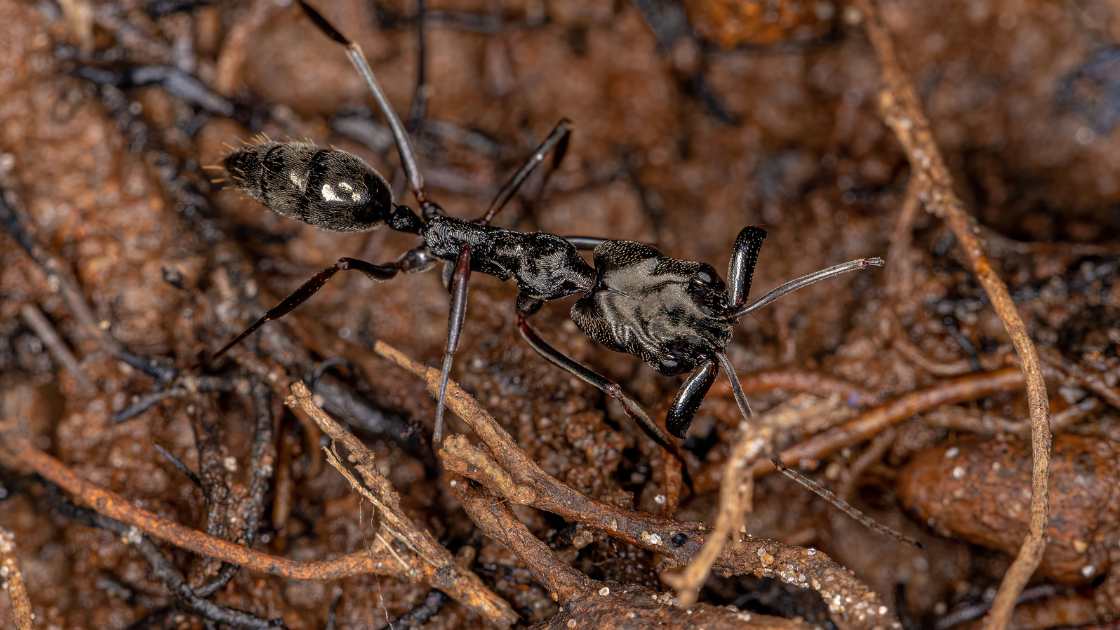
These do-it-yourself solutions not only save money but also offer a customizable approach to ant control. Let’s explore how to craft these traps and strategically place them for maximum effect.
Creating Homemade Ant Baits Using Household Items
Banishing ants begins with crafting a bait they cannot resist. Here’s how to turn common pantry staples into potent ant baits:
- Boric acid and sugar: Mix 1 part boric acid with 3 parts powdered sugar.
- Peanut butter blends: Combine 1 part boric acid with 2 parts peanut butter for protein-loving ants.
- Sticky syrup trap: Heat equal parts sugar, water, and honey until it becomes a thick syrup.
Once the bait is ready, fill tiny containers like bottle caps or plastic lids. Place these baits near the kitchen sink drain.
Strategies For Placing And Monitoring Diy Traps
Effective placement ensures ants find and carry the bait back to their colonies.
| Location | Type of Bait | Monitor Frequency |
|---|---|---|
| Near sink drain | Liquid | Daily |
| Under appliances | Paste | Every 2 days |
| Along paths | Granular | Twice a week |
Check these traps regularly. Replenish as needed to maintain their potency. Note any shifts in ant behavior or traffic patterns and adjust the placement of your traps accordingly. Consistent monitoring and adaptation are key to successful DIY ant control.
Professional Pest Control Options
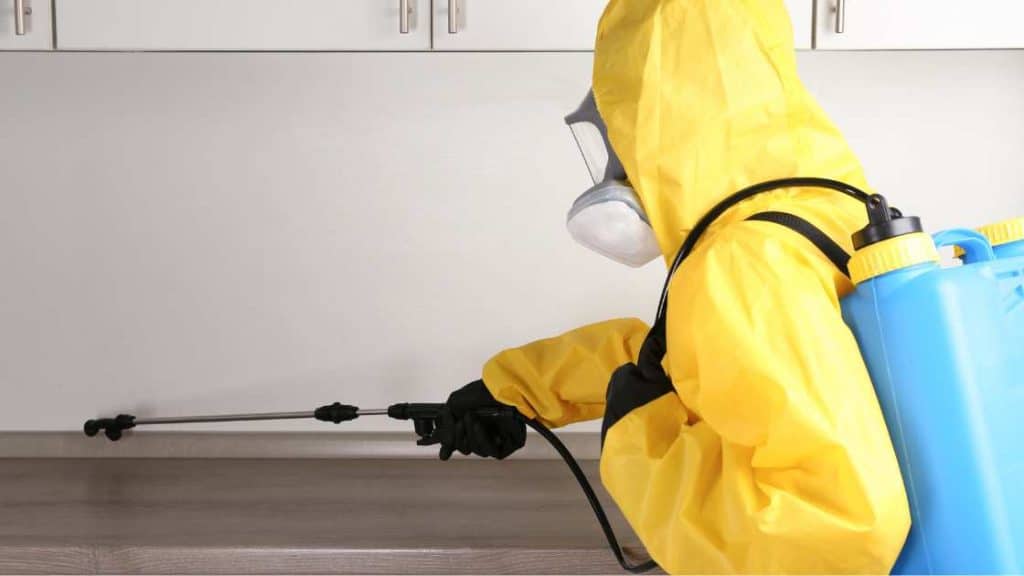
Battling relentless ants in your kitchen sink drain can feel like an uphill struggle. Sometimes do-it-yourself remedies just don’t cut it. It’s time to consider professional pest control options. With expert help, you can bid farewell to the ant invasion swiftly and effectively.
When To Call In The Experts For Ant Infestations
Identifying the right time to call professionals is essential for an ant-free kitchen. Here are some signs:
- Continuous and present even after trying multiple home remedies.
- Spotting larger colonies or carpenter ants can cause structural damage.
- Ants appear all over your kitchen, not just near the sink.
- You’re encountering multiple nests, making DIY tactics inefficient.
What To Expect During Professional Ant Extermination
Knowing what the professional procedure involves can ease your concerns:
- Inspection: Experts start with a thorough examination of your kitchen and home.
- Identification: They determine the ant species to ensure effective treatment.
- Customized Plan: A unique extermination plan is crafted based on the infestation level.
- Treatment Application: Safe and targeted treatments are applied to eradicate ants.
- Follow-Up: Professionals may revisit to ensure the ants haven’t returned.
A mix of gels, baits, and non-repellent chemicals is often utilized. The safety of your family and pets remains the top priority for reputable exterminators.
Regular Drain Maintenance To Prevent Ants
Nobody likes uninvited guests, especially ants in the kitchen sink drain. Regular maintenance is key to keeping these tiny invaders away. It’s not just about cleanliness; it’s a necessary routine to safeguard your home from pest invasions. Let’s explore some effective strategies.
The Importance of Regular Cleaning of Sink Drains
Clean drains mean fewer chances for ants to gather. Food particles often get stuck in drains, attracting ants searching for sustenance. A clean drain provides no food, sending ants marching elsewhere. Ensure every meal ends with a thorough drain check.
- Weekly rinsing with hot water eliminates lingering food particles.
- Baking soda and vinegar break down organic materials once a month.
- Use a drain strainer to catch solids before they become ant feasts.
Products and Tools for Effective Drain Maintenance
Equip yourself with the right products and tools to maintain an ant-free drain. Consistent use keeps the kitchen sink pristine and unappealing to pests. See the list below for essentials:
| Product/Tool | Use |
|---|---|
| Enzymatic cleaner | Degrades organic buildup safely. |
| Drain brush | Scrubs away stubborn residue. |
| Boiling water | Flushes out oils and food particles. |
| Baking soda & vinegar | Acts as a natural unclogging mixture. |
Handling Repeat Bug Visits
Your kitchen sink drain might seem to offer the perfect refuge for ants. A reliable water source and easy access to food particles make it a frequent target for these persistent creatures. Eliminating ants from the kitchen sink requires more than just a quick fix.
Investigating The Underlying Causes Of Repeated Issues
Finding the root cause is key to stopping the cycle of ant invasions. Look inside the sink drain and surrounding areas for clues. Excess moisture or food residue can attract ants repeatedly. Check for small cracks or gaps around the sink where ants could be entering.
- Examine the sink for standing water.
- Scrub out food residue regularly.
- Inspect for tiny openings around the drain.
Long-term Solutions For Ongoing Ant Problems
Maintain a consistent cleaning routine to keep ants at bay. Use vinegar or baking soda solutions to clean the drains. Seal any gaps around the sink. A pest control professional can offer more permanent solutions.
| Method | Description | Frequency |
|---|---|---|
| Natural Cleaners | Use vinegar or baking soda to create a hostile environment for ants. | Weekly |
| Sealing Cracks | Apply caulk to seal potential ant entry points. | As needed |
| Professional Help | Consult experts for persistent infestations. | Annually |
Remember, prevention is better than cure. Keep your sink dry and clean to avoid future ant problems.
Additional Tips And Tricks For Ant Prevention
Fighting off ants requires strategy beyond the kitchen sink. Your whole home must become a no-go zone for these tiny invaders.
Stay one step ahead with smart prevention methods. Follow these practical tips to ensure ants don’t see your kitchen as their next vacation spot.
Utilizing Ant Deterrents Beyond The Kitchen Sink
Keep ants at bay with deterrents that work house-wide. It’s not just about the sink. Here are several ways to extend your ant defensive line:
- Seal Up: Close all entry points. Check for cracks and crevices. Use silicone caulk to block them.
- Storage Matters: Store food in sealed containers. If ants can’t smell it, they won’t come for it.
- Clean Routinely: Wipe surfaces daily. No crumbs mean no ant feasts.
- Dry Areas: Keep areas dry. Ants love moisture. Fix leaks and avoid standing water.
- Natural Repellents: Use vinegar, peppermint oil, or cinnamon. Wipe down surfaces and use as a spray to deter them.
Innovative Homeowner Techniques To Share
Here’s a roundup of clever tricks from savvy homeowners:
- Chalk Lines: Draw chalk lines near entry points. Ants dislike crossing them.
- Boric Acid Bait: Mix boric acid with sweet bait. Place near trails. It’s effective but use it with caution, especially with pets and kids.
- Citrus Peels: Grind lemon or orange peels in the drain. Ants hate the scent and it freshens your sink too!
- Herbs and Spices: Sprinkle cinnamon, cloves, or garlic in problem areas. Their strong scents repel ants.
- Diatomaceous Earth: This powder is safe for humans but deadly for ants. Sprinkle it around the kitchen.
Remember, it’s not just a single tactic but a combination of efforts that keeps ants away for good. Share your successes and learn from others to maintain an ant-free kitchen.
Creating A Sustainable Ant-free Kitchen
Finding ants crawling around the kitchen sink drain can be annoying. By establishing a sustainable, clean environment, these unwanted guests can be kept at bay.
This guide provides a blueprint to maintain a kitchen that deters ants naturally, without relying on harsh chemicals.
Review Of Effective Strategies And Best Practices
To start an ant-free kitchen journey, consider these strategies:
- Seal entry points: Fill cracks and crevices around the sink and counters.
- Maintain cleanliness: Wipe down surfaces daily to remove crumbs and residues.
- Dispose of waste promptly: Keep trash cans sealed and take out the garbage regularly.
- Use natural repellents: Citrus peels or essential oils can deter ants.
- Dry out sink regularly: Wipe the sink after use, as ants look for water.
Developing A Personalized Plan For Your Home
Create a unique plan tailored to your home’s needs. Follow these steps:
- Investigate patterns: Take note of where and when ants appear.
- Choose treatments that fit: Pick suitable methods from the review section.
- Persistent execution: Apply your strategy consistently over time.
- Adjust as necessary: Monitor progress and tweak methods if needed.
A successful plan combines proper maintenance with targeted ant deterrents.
Frequently Asked Questions Of How To Get Rid Of Ants In Kitchen Sink Drain
What Causes Ants In Kitchen Drains?
Ants are often drawn to kitchen sinks due to food particles and moisture. This environment provides them with necessary resources like water and potential food from leftover residue, making your kitchen sink an attractive destination for these pests.
How Can I Naturally Repel Ants?
To repel ants naturally, use ingredients like vinegar, baking soda, or lemon. Mix equal parts vinegar and water to create a repellent spray. Alternatively, sprinkle baking soda directly into the drain. Lemon juice or peels also deter ants due to their strong scent.
Are There Quick Solutions For Ant Infestations?
Yes, quick solutions include pouring boiling water down the drain to eliminate ants instantly. You can also apply ant baits around the sink area to attract and poison ants, reducing the population rapidly.
Do Chemical Ant Killers Damage Sink Pipes?
Some chemical ant killers can harm sink pipes, especially if they contain harsh substances. Always check the product’s compatibility with your plumbing and use it according to the manufacturer’s instructions to avoid damage to your sink’s pipes.
Why am I getting ants in my kitchen sink?
You may be getting ants in your kitchen sink due to food residue or spills attracting them. Ensure you clean your sink regularly and address any food crumbs to deter ants from being drawn to the area.
Why are ants coming out of my drain?
Ants may be emerging from your drain due to the presence of food particles or sugary substances that attract them. To address this issue, consider thoroughly cleaning the drain and ensuring any spills or crumbs are promptly cleaned to discourage ant activity.
Conclusion
Bidding farewell to ants in your kitchen sink drain is manageable with these steps. Consistency is key—revisit your cleaning routine often. Natural remedies can be effective and safe for your household. For persistent problems, professional help might be necessary. Keep your kitchen sink ant-free and enjoy a pristine home environment.

